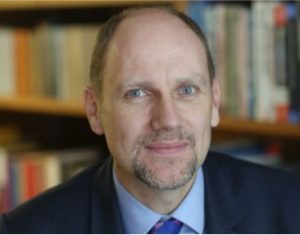The first training session was held on 18 March 2021. Our speaker, Prof. Eric Neumayer, is Professor for Environment and Development at the London School of Economics. Prof. Neumayer has published extensively on topics related to Global Challenge areas, and co-edited the ‘Handbook of Sustainable Development’. He has also published a monograph entitled ‘Weak versus Strong Sustainability: Exploring the Limits of Two Opposing Paradigms’, which is now in its fourth edition.

Professor Eric Neumayer. Image: © LSE 2021
Second-year GCDC student Michaela Lo gave us her thoughts and reflections on the lecture.
“We often hear the words ‘sustainability’ or ‘sustainable development’ floating around, but do we actually know what they mean? PhD students and researchers from the Global Challenges Doctoral Centre (GCDC) had the great pleasure to welcome Professor Eric Neumayer to give us the “Sustainability 101″ talk. At each step, Prof. Neumayer made sure to clarify and speak in a way that was non-jargony so that we, as students who came from diverse disciplines and backgrounds, could all understand. From the get-go, Prof. Neumayer emphasised that he came from an economics perspective, thus highlighting how the sustainability concept can be pulled, shaped, and moulded depending on the discipline one comes from.
As GCDC students and researchers, we were all encouraged to reflect on the relevance of sustainable development in our own research. One of the huge struggles that we face currently is not only the balance between environmental loss and economic development, but also issues around inter-generational equity (i.e. between current and future generations), and intra-generational equity (i.e. between people within the current generation). The inclusion or exclusion of the latter, Prof. Neumayer states, can present trade-offs relating to the rigour of our academic research.
As someone who has adopted interdisciplinarity since the beginning of my journey in academia, I wondered whether embracing a narrow or broad concept of sustainability development would influence the analytical tractability of my work. I also thought about the repercussions this may have on how I develop, carrying out, and interpret my research.
As part of the GCDC, our research aims to address incredibly complex challenges that occur in developing countries. Whether we adopt a narrow or broad concept of sustainability, it is nonetheless imperative to understand the implications that our research has on global equity and justice. All researchers in GCDC are undertaking fascinating research projects, and through our endeavour to make sense of these global challenges, we hope to develop meaningful work that contributes to enhancing the lives of current and future generations, in all its complexities.”
Michaela Lo, GCDC PhD student in the School of Anthropology and Conservation